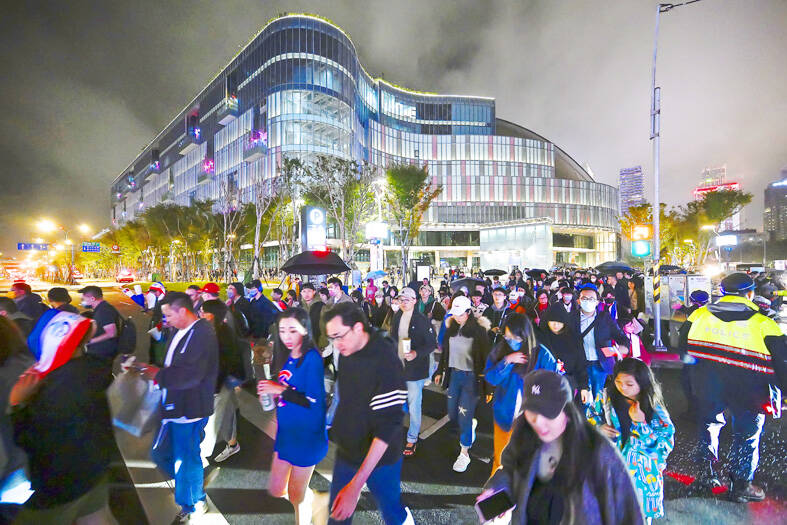Crowd control at the Taipei Dome’s first official event on Sunday went smoothly, with the surrounding streets cleared of 16,647 spectators 30 minutes after Taiwan won its Asian Baseball Championship opener against South Korea 4-0.
After the final out of the game at about 8:30pm, staffers holding signboards guided the crowd toward exits, while about 10 police officers directed traffic at nearby intersections.
With the help of free shuttle buses ferrying spectators away from the stadium on six routes, the area was largely free of traffic and crowds by 9pm.

Photo: Chen Chih-chu, Taipei Times
Some supporters said it was easy to find exits, but many said they had no idea there were free shuttles that would take them to Taipei Main Station and Zhongxiao Fuxing MRT Station.
A crowd near Sun Yat-sen Memorial Hall MRT Station, the closest station to the Taipei Dome, had largely dispersed 25 minutes after the game ended, as trains were running every 2.5 minutes.
A couple in their 70s who have been baseball supporters for many years said the experience at the game was great.
The couple, who live in Taoyuan, said they wanted to leave the Taipei Dome quickly after the game and were satisfied with the signs directing them out of the stadium.
However, a supporter identified as Chou (周), who also lives in Taoyuan, said that because most of the signs were held by staffers, the task would become more challenging with bigger crowds.
Chou said that more signs should be installed at the entrances to the stadium.
A baseball fan surnamed Pai (白) said he rode to the Taipei Dome from Xinyi District (信義) on a YouBike, adding that the police did a great job directing crowds.
Also among the attendees was Taipei City Councilor Wang Hsin-yi (王欣儀).
She said that the 3,000 staffers on hand ensured the crowd departed the stadium smoothly.
During yesterday’s game between the Philippines and Thailand, the indoor stadium sprung a leak, sending water streaming down the left field line, which operator Farglory Group attributed to poorly connected water pipes.
Meanwhile, an alarm went off during the game, which it said was due to ongoing work on the unfinished basement.

The Sports Administration yesterday demanded an apology from the national table tennis association for barring 17-year-old Yeh Yi-tian (葉伊恬) from competing in the upcoming World Table Tennis (WTT) United States Smash tournament in Las Vegas this July. The sports agency said in a statement that the Chinese Taipei Table Tennis Association (CTTTA) must explain to the public why it withdrew Yeh from the WTT tournament in Las Vegas. The sports agency said it contacted the association to express its disapproval of the decision-making process after receiving a complaint from Yeh’s coach, Chuang

Taipei has once again made it to the top 100 in Oxford Economics’ Global Cities Index 2025 report, moving up five places from last year to 60. The annual index, which was published last month, evaluated 1,000 of the most populated metropolises based on five indices — economics, human capital, quality of life, environment and governance. New York maintained its top spot this year, placing first in the economics index thanks to the strength of its vibrant financial industry and economic stability. Taipei ranked 263rd in economics, 44th in human capital, 15th in quality of life, 284th for environment and 75th in governance,

The Hualien Branch of the High Court today sentenced the main suspect in the 2021 fatal derailment of the Taroko Express to 12 years and six months in jail in the second trial of the suspect for his role in Taiwan’s deadliest train crash. Lee Yi-hsiang (李義祥), the driver of a crane truck that fell onto the tracks and which the the Taiwan Railways Administration's (TRA) train crashed into in an accident that killed 49 people and injured 200, was sentenced to seven years and 10 months in the first trial by the Hualien District Court in 2022. Hoa Van Hao, a

Control Yuan Secretary-General Lee Chun-yi (李俊俋) tendered his resignation last night, admitting that he had misused a government vehicle, as reported by media. His resignation was immediately accepted by the Control Yuan. In a statement explaining why he had resigned, Lee apologized for using a Control Yuan vehicle to transport his dog to a pet grooming salon on May 20. The issue first came to light late last month, when TVBS News reported that Lee had instructed his driver to take the dog to the salon. The news channel broadcast photos that it said were taken by an unnamed whistle-blower, which purportedly showed the